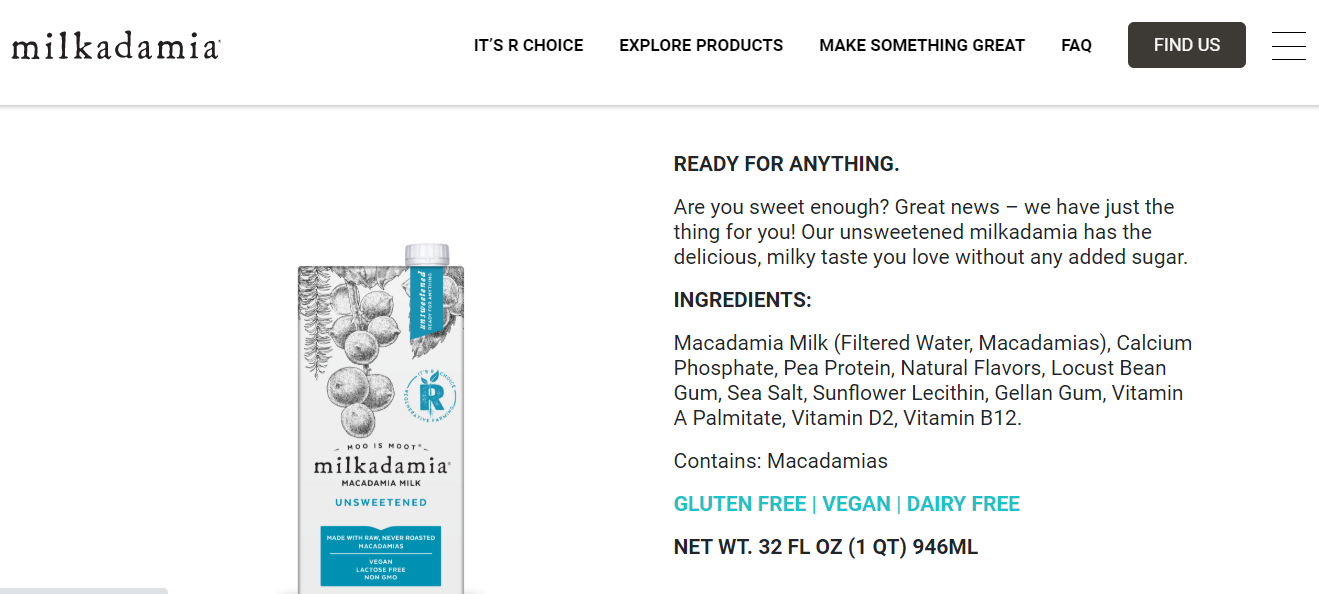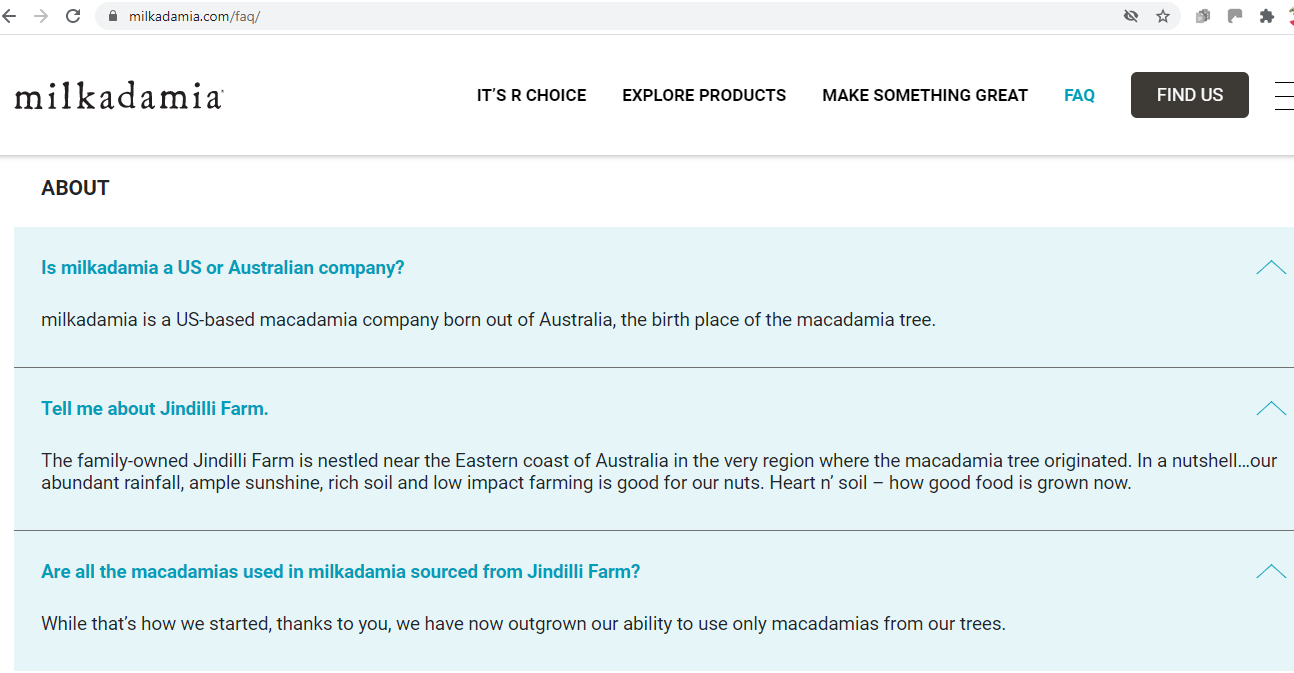Milkadamia’s Mistake in Using Palm Oil Free Marketing
The Aussie brand, Milkdamamia, manufactured by Jindilli Inc and Jindilli Beverages is promoting its palm oil free status heavily as the company struggles for market share in the vegan market.
The marketing campaign which launched in June 2020 was picked up by a few vegan blogs which did not seem to have paid off the company’s hope for market traction with its palm oil free claim.
What may cause the palm oil free marketing campaign for Milkadamia to fail?
The marketing campaign which launched in June 2020 was picked up by a few vegan blogs which did not seem to have paid off the company’s hope for market traction with its palm oil free claim.
What may cause the palm oil free marketing campaign for Milkadamia to fail?
This maybe an unfortunate learning experience for Jindilli and Milkadamia because once a brand or product declares itself as “free” of something, it will open a new can of worms for consumers who would start questioning, well, OK, your product is free of this. Does it mean it is also free of all the other things that are bad for people and planet?
The Milkadamia website, where one would usually go to for information on the products, offers up skimpy information. A screenshot capture of the FAQ is vague to the extreme as the company tries to shift the attention of information seekers with a candy.
The Milkadamia website, where one would usually go to for information on the products, offers up skimpy information. A screenshot capture of the FAQ is vague to the extreme as the company tries to shift the attention of information seekers with a candy.
|
Milkadamia should have realized that the FAQs on its website may open a whole new can of worms beyond their ability to suppress.
Consumers today are well informed on the issues beyond that of palm oil as environmental groups question the sustainability of products from its packaging right down to whether it benefits economies where the products are sold. |
The “About” page on Milkadamia’s website offers the same eye candy as "FAQ" page which is puzzling for a brand to not share more information on the corporate website as it does in its press releases. It may be that Jindilli Beverages hopes its association with the cool brand behind “Australia” will continue to pay off even as it has left its Aussie roots in search of corporate expansion in America.
Information that is available can only be described as hodge podgery. The Jindilli farm where Milkadamia got its nuts from in its Aussie operations is described with heart warming words like:
“The family-owned Jindilli Farm is nestled near the Eastern coast of Australia in the very region where the macadamia tree originated. In a nutshell…our abundant rainfall, ample sunshine, rich soil and low impact farming is good for our nuts. Heart n’ soil – how good food is grown now.”
This sounds exactly like what a palm oil company would say. That their palm oil is a super efficient crop because of abundant rainfall, ample sunshine, rich soils and low impact farming. As for telling where Milkadamia gets its macadamia nuts come from, the company reaches back into its roots to fudge the question with a simpletons reply that it was:
“born out of Australia, the birth place of the macadamia tree” and “thanks to you, we have outgrown our ability to only use macadamias from our trees.”
The informed customer must surely ask, what are the carbon emissions from shipping a macadamia from Australia to the USA to make Milkadamia?
More troubling for Milkadamia would be the question, where are the rest of the macadamia nuts from now that the company has outgrown demand from its own farm? Shouldn’t basic corporate information like these be displayed on their website?
Confused consumers get no help with wording on Milkadamia products from the website of its wholesaler, Natura:
“If only we were able to claim that we, the people of milkadamia, always progress with steely resolve. That we are fueled by constant hope and elevated thoughts, but of course, our lives are as gloriously, messily, humanly uncertain, and contradictory as they are hopeful and exuberant. Yet we dare aspire to create milkadamia as not merely a (ridiculously delicious) plant-based milk, but as an advocate for our earth, our health, and our future.
Faced with an unraveling climate-scape percussing the very fabric of this fantastic planet. Our home, where chaos and beauty, so achingly, co-exist, our hope resides in the common-sense of ordinary folk. Nothing is achieved by directing blame-thirsty fingers outward, toward others and away from ourselves – we got into this together, we will experience it, or we will mitigate it, together.”
Its mind boggling how that was approved as marketing text for a wholesale platform.
As the company attempts to tap into the vegan market as blogged by a few vegan sites including GoDairyFree, new questions pop up as to the source of its Vitamin A palmitate content. As far as we know, the common food sources for Vitamin A Palmitate are animal-based foods, including meat and eggs as well as dairy products. Liver, fish and fortified cereals are also popular sources of vitamin A palmitate.
The popular website for consumers looking to become vegan, YourVeganJourney, explains Vitamin A Palmitate in detail:
“Palmitic acid is a fatty acid that is commonly sourced from palm oil but can be derived from animals.”
There is the can of worms for Jindilli Beverages and Milkadamia. The questions that the consumers should be asking now as well, is what are the sources of your Vitamin A Palmitate?
If it is from palm oil, then Milkadamia is not exactly “palm oil free.” If it is from animal sources, then Milkadamia is definitely not vegan.
And that’s just for a minor ingredient in Milkadamia. The bigger question of where its source of macadamia nuts comes from deserves a transparent answer. Macadamia nuts may have originated from Australia but its commercial plantations are located now from South Africa to Brazil, Costa Rica and the US states of California and Hawaii. These are place whose biodiversities are way more threatened than that of Malaysia and Indonesia.
The choice by Jindilli Beverages to market its Milkadamia product as palm oil free and vegan may prove to be a very expensive mistake by the marketing department. The basic lesson when brands decide to use palm oil free as a marketing angle is to throw stones only when you know for sure your marketing angle will not raise new questions on other ingredients.
Published August 16, 2020. CSPO Watch
Information that is available can only be described as hodge podgery. The Jindilli farm where Milkadamia got its nuts from in its Aussie operations is described with heart warming words like:
“The family-owned Jindilli Farm is nestled near the Eastern coast of Australia in the very region where the macadamia tree originated. In a nutshell…our abundant rainfall, ample sunshine, rich soil and low impact farming is good for our nuts. Heart n’ soil – how good food is grown now.”
This sounds exactly like what a palm oil company would say. That their palm oil is a super efficient crop because of abundant rainfall, ample sunshine, rich soils and low impact farming. As for telling where Milkadamia gets its macadamia nuts come from, the company reaches back into its roots to fudge the question with a simpletons reply that it was:
“born out of Australia, the birth place of the macadamia tree” and “thanks to you, we have outgrown our ability to only use macadamias from our trees.”
The informed customer must surely ask, what are the carbon emissions from shipping a macadamia from Australia to the USA to make Milkadamia?
More troubling for Milkadamia would be the question, where are the rest of the macadamia nuts from now that the company has outgrown demand from its own farm? Shouldn’t basic corporate information like these be displayed on their website?
Confused consumers get no help with wording on Milkadamia products from the website of its wholesaler, Natura:
“If only we were able to claim that we, the people of milkadamia, always progress with steely resolve. That we are fueled by constant hope and elevated thoughts, but of course, our lives are as gloriously, messily, humanly uncertain, and contradictory as they are hopeful and exuberant. Yet we dare aspire to create milkadamia as not merely a (ridiculously delicious) plant-based milk, but as an advocate for our earth, our health, and our future.
Faced with an unraveling climate-scape percussing the very fabric of this fantastic planet. Our home, where chaos and beauty, so achingly, co-exist, our hope resides in the common-sense of ordinary folk. Nothing is achieved by directing blame-thirsty fingers outward, toward others and away from ourselves – we got into this together, we will experience it, or we will mitigate it, together.”
Its mind boggling how that was approved as marketing text for a wholesale platform.
As the company attempts to tap into the vegan market as blogged by a few vegan sites including GoDairyFree, new questions pop up as to the source of its Vitamin A palmitate content. As far as we know, the common food sources for Vitamin A Palmitate are animal-based foods, including meat and eggs as well as dairy products. Liver, fish and fortified cereals are also popular sources of vitamin A palmitate.
The popular website for consumers looking to become vegan, YourVeganJourney, explains Vitamin A Palmitate in detail:
“Palmitic acid is a fatty acid that is commonly sourced from palm oil but can be derived from animals.”
There is the can of worms for Jindilli Beverages and Milkadamia. The questions that the consumers should be asking now as well, is what are the sources of your Vitamin A Palmitate?
If it is from palm oil, then Milkadamia is not exactly “palm oil free.” If it is from animal sources, then Milkadamia is definitely not vegan.
And that’s just for a minor ingredient in Milkadamia. The bigger question of where its source of macadamia nuts comes from deserves a transparent answer. Macadamia nuts may have originated from Australia but its commercial plantations are located now from South Africa to Brazil, Costa Rica and the US states of California and Hawaii. These are place whose biodiversities are way more threatened than that of Malaysia and Indonesia.
The choice by Jindilli Beverages to market its Milkadamia product as palm oil free and vegan may prove to be a very expensive mistake by the marketing department. The basic lesson when brands decide to use palm oil free as a marketing angle is to throw stones only when you know for sure your marketing angle will not raise new questions on other ingredients.
Published August 16, 2020. CSPO Watch


